Globalization and International Organizations
VerifiedAdded on 2020/02/05
|6
|1453
|105
Report
AI Summary
This assignment explores the multifaceted roles of international organizations like the International Monetary Fund (IMF) and the World Bank in shaping global economies. It analyzes their impact on economic growth, poverty reduction, and the rule of law. The assignment further delves into 'Ban the Box' laws, which restrict employers from inquiring about criminal history during early stages of hiring. It examines how these laws aim to reduce barriers for formerly incarcerated individuals seeking employment while balancing employer concerns.
Contribute Materials
Your contribution can guide someone’s learning journey. Share your
documents today.
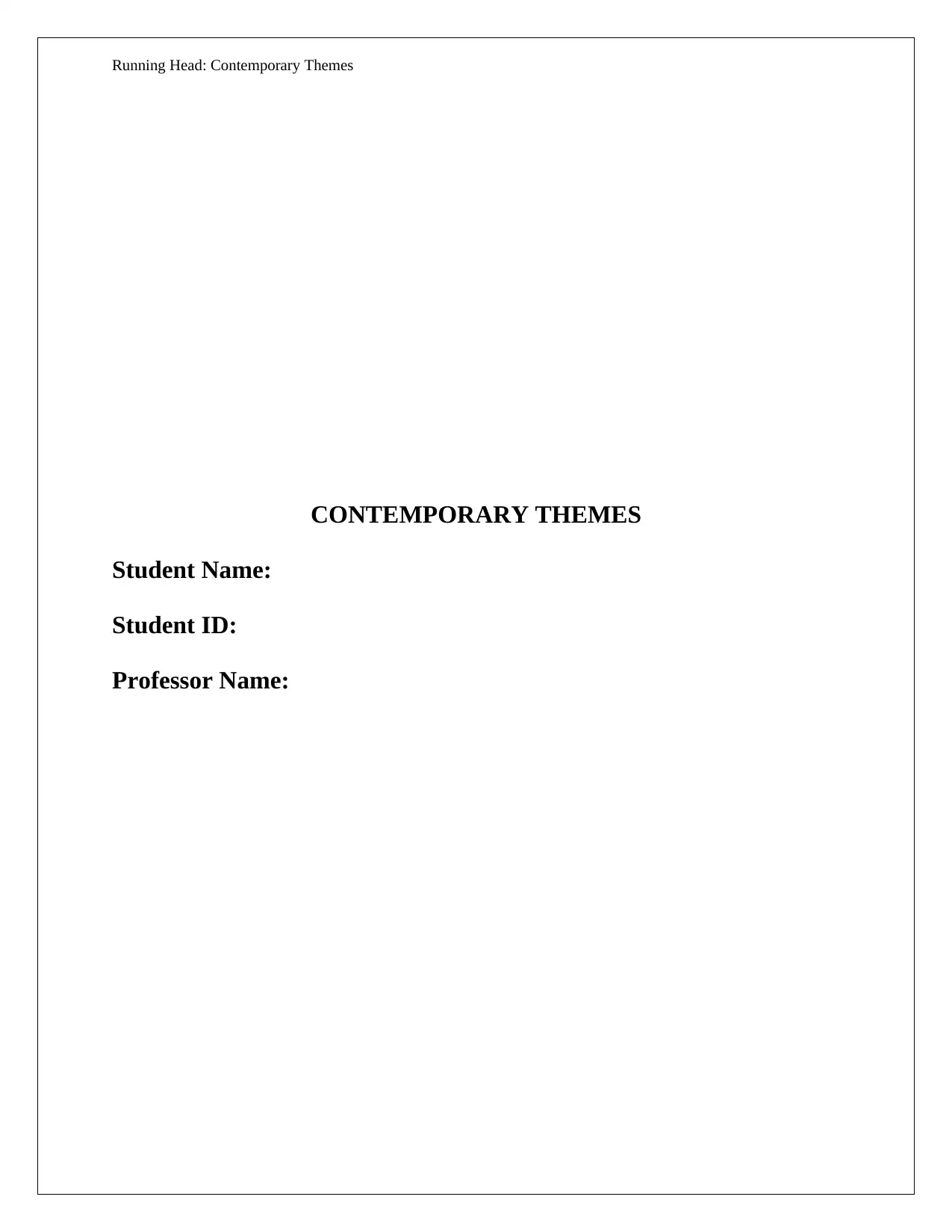
Running Head: Contemporary Themes
CONTEMPORARY THEMES
Student Name:
Student ID:
Professor Name:
CONTEMPORARY THEMES
Student Name:
Student ID:
Professor Name:
Secure Best Marks with AI Grader
Need help grading? Try our AI Grader for instant feedback on your assignments.
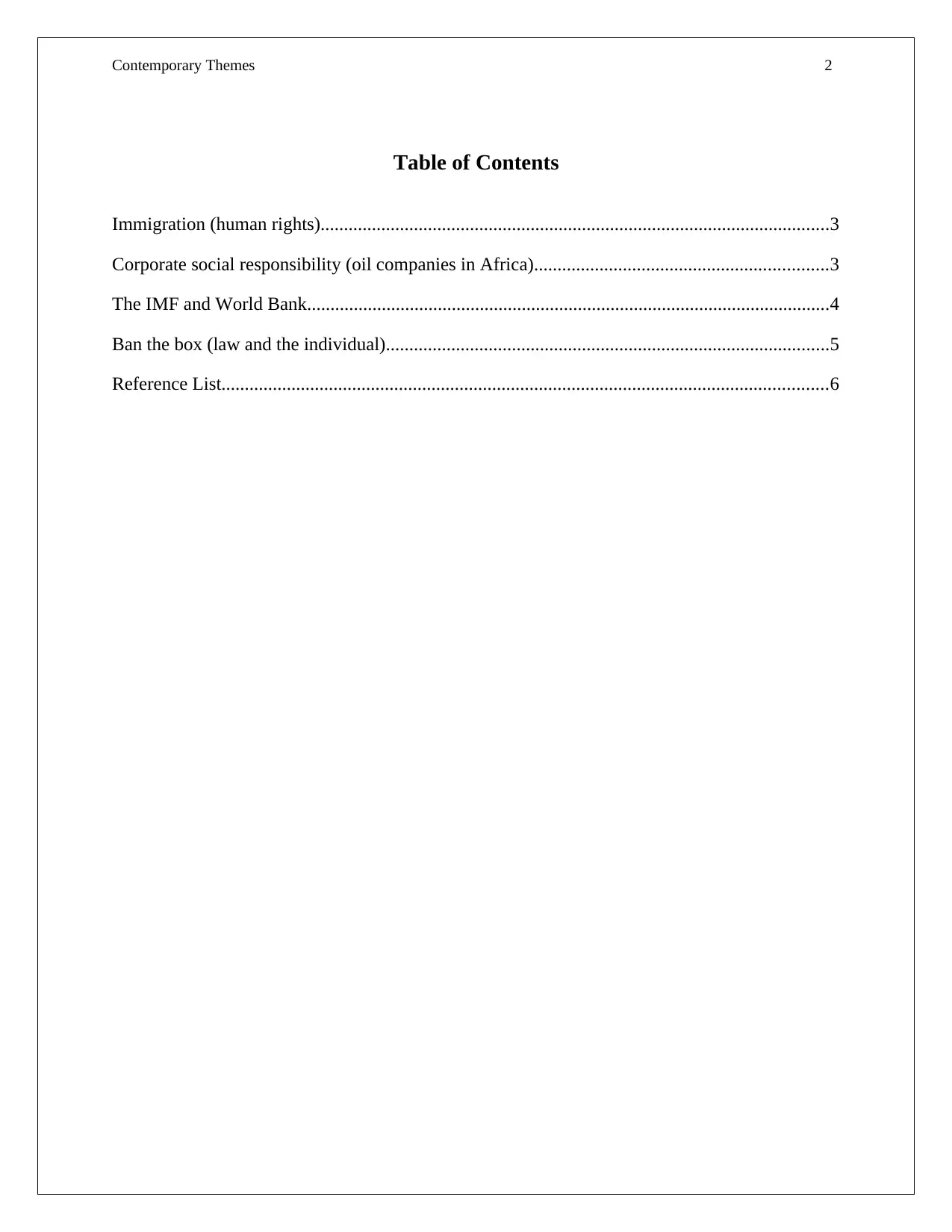
Contemporary Themes 2
Table of Contents
Immigration (human rights).............................................................................................................3
Corporate social responsibility (oil companies in Africa)...............................................................3
The IMF and World Bank................................................................................................................4
Ban the box (law and the individual)...............................................................................................5
Reference List..................................................................................................................................6
Table of Contents
Immigration (human rights).............................................................................................................3
Corporate social responsibility (oil companies in Africa)...............................................................3
The IMF and World Bank................................................................................................................4
Ban the box (law and the individual)...............................................................................................5
Reference List..................................................................................................................................6
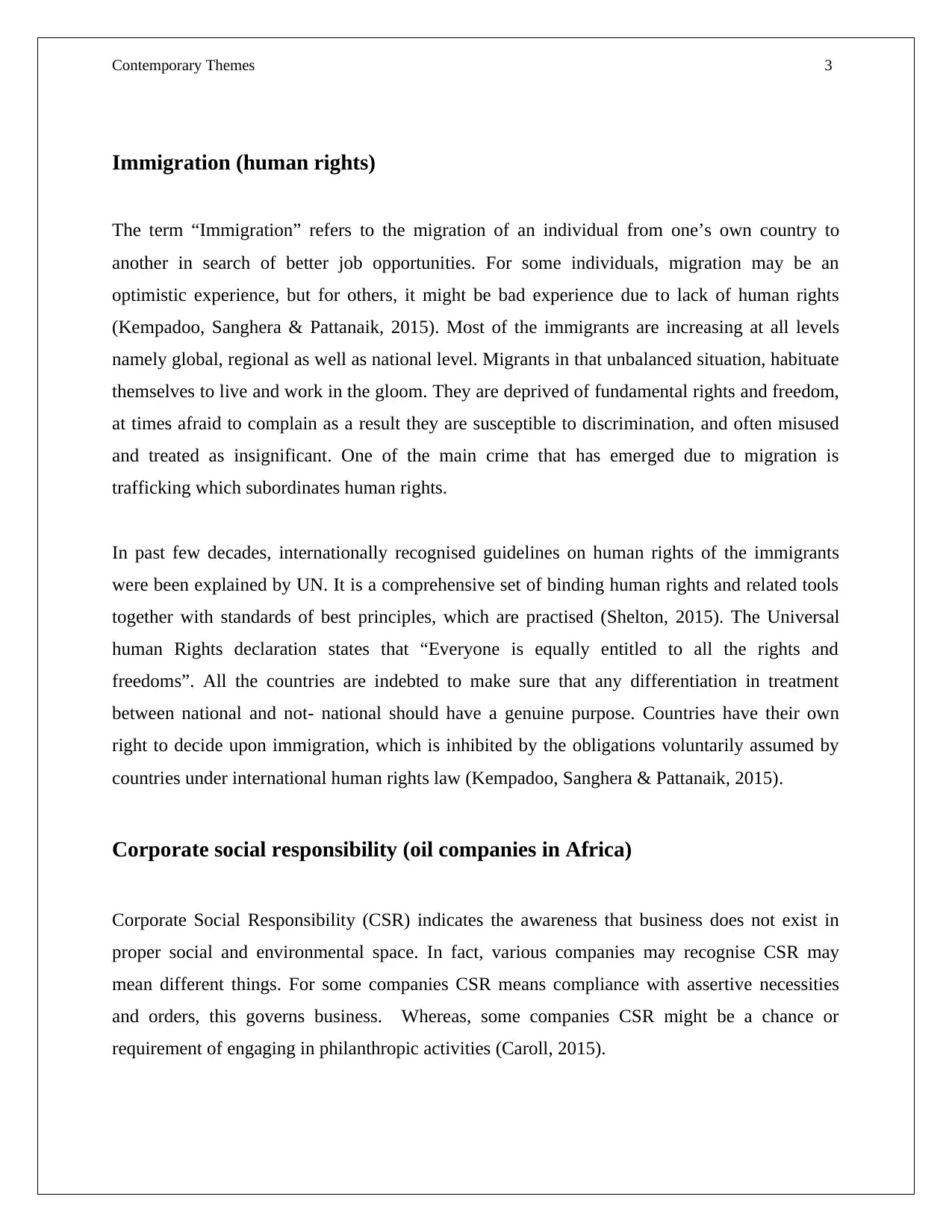
Contemporary Themes 3
Immigration (human rights)
The term “Immigration” refers to the migration of an individual from one’s own country to
another in search of better job opportunities. For some individuals, migration may be an
optimistic experience, but for others, it might be bad experience due to lack of human rights
(Kempadoo, Sanghera & Pattanaik, 2015). Most of the immigrants are increasing at all levels
namely global, regional as well as national level. Migrants in that unbalanced situation, habituate
themselves to live and work in the gloom. They are deprived of fundamental rights and freedom,
at times afraid to complain as a result they are susceptible to discrimination, and often misused
and treated as insignificant. One of the main crime that has emerged due to migration is
trafficking which subordinates human rights.
In past few decades, internationally recognised guidelines on human rights of the immigrants
were been explained by UN. It is a comprehensive set of binding human rights and related tools
together with standards of best principles, which are practised (Shelton, 2015). The Universal
human Rights declaration states that “Everyone is equally entitled to all the rights and
freedoms”. All the countries are indebted to make sure that any differentiation in treatment
between national and not- national should have a genuine purpose. Countries have their own
right to decide upon immigration, which is inhibited by the obligations voluntarily assumed by
countries under international human rights law (Kempadoo, Sanghera & Pattanaik, 2015).
Corporate social responsibility (oil companies in Africa)
Corporate Social Responsibility (CSR) indicates the awareness that business does not exist in
proper social and environmental space. In fact, various companies may recognise CSR may
mean different things. For some companies CSR means compliance with assertive necessities
and orders, this governs business. Whereas, some companies CSR might be a chance or
requirement of engaging in philanthropic activities (Caroll, 2015).
Immigration (human rights)
The term “Immigration” refers to the migration of an individual from one’s own country to
another in search of better job opportunities. For some individuals, migration may be an
optimistic experience, but for others, it might be bad experience due to lack of human rights
(Kempadoo, Sanghera & Pattanaik, 2015). Most of the immigrants are increasing at all levels
namely global, regional as well as national level. Migrants in that unbalanced situation, habituate
themselves to live and work in the gloom. They are deprived of fundamental rights and freedom,
at times afraid to complain as a result they are susceptible to discrimination, and often misused
and treated as insignificant. One of the main crime that has emerged due to migration is
trafficking which subordinates human rights.
In past few decades, internationally recognised guidelines on human rights of the immigrants
were been explained by UN. It is a comprehensive set of binding human rights and related tools
together with standards of best principles, which are practised (Shelton, 2015). The Universal
human Rights declaration states that “Everyone is equally entitled to all the rights and
freedoms”. All the countries are indebted to make sure that any differentiation in treatment
between national and not- national should have a genuine purpose. Countries have their own
right to decide upon immigration, which is inhibited by the obligations voluntarily assumed by
countries under international human rights law (Kempadoo, Sanghera & Pattanaik, 2015).
Corporate social responsibility (oil companies in Africa)
Corporate Social Responsibility (CSR) indicates the awareness that business does not exist in
proper social and environmental space. In fact, various companies may recognise CSR may
mean different things. For some companies CSR means compliance with assertive necessities
and orders, this governs business. Whereas, some companies CSR might be a chance or
requirement of engaging in philanthropic activities (Caroll, 2015).
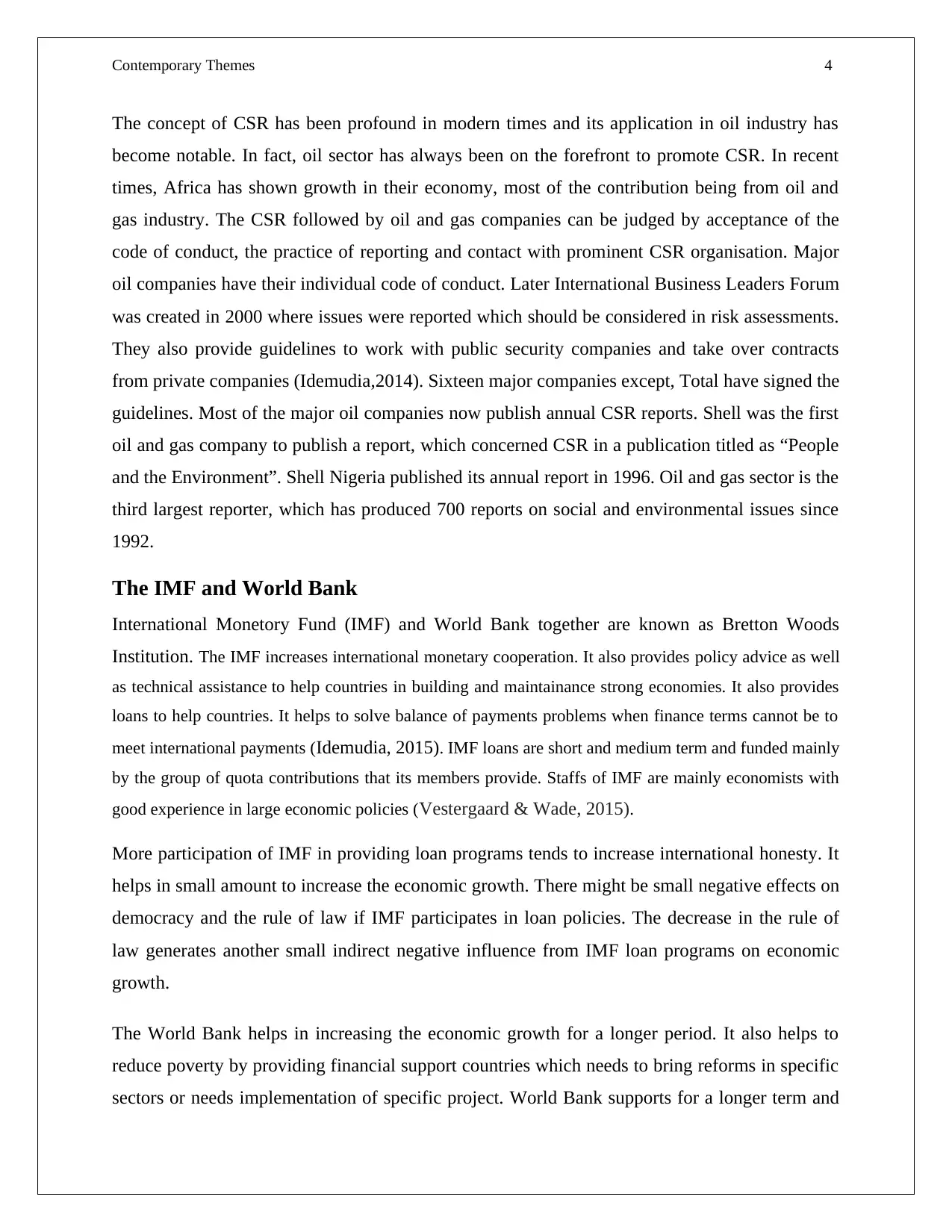
Contemporary Themes 4
The concept of CSR has been profound in modern times and its application in oil industry has
become notable. In fact, oil sector has always been on the forefront to promote CSR. In recent
times, Africa has shown growth in their economy, most of the contribution being from oil and
gas industry. The CSR followed by oil and gas companies can be judged by acceptance of the
code of conduct, the practice of reporting and contact with prominent CSR organisation. Major
oil companies have their individual code of conduct. Later International Business Leaders Forum
was created in 2000 where issues were reported which should be considered in risk assessments.
They also provide guidelines to work with public security companies and take over contracts
from private companies (Idemudia,2014). Sixteen major companies except, Total have signed the
guidelines. Most of the major oil companies now publish annual CSR reports. Shell was the first
oil and gas company to publish a report, which concerned CSR in a publication titled as “People
and the Environment”. Shell Nigeria published its annual report in 1996. Oil and gas sector is the
third largest reporter, which has produced 700 reports on social and environmental issues since
1992.
The IMF and World Bank
International Monetory Fund (IMF) and World Bank together are known as Bretton Woods
Institution. The IMF increases international monetary cooperation. It also provides policy advice as well
as technical assistance to help countries in building and maintainance strong economies. It also provides
loans to help countries. It helps to solve balance of payments problems when finance terms cannot be to
meet international payments (Idemudia, 2015). IMF loans are short and medium term and funded mainly
by the group of quota contributions that its members provide. Staffs of IMF are mainly economists with
good experience in large economic policies (Vestergaard & Wade, 2015).
More participation of IMF in providing loan programs tends to increase international honesty. It
helps in small amount to increase the economic growth. There might be small negative effects on
democracy and the rule of law if IMF participates in loan policies. The decrease in the rule of
law generates another small indirect negative influence from IMF loan programs on economic
growth.
The World Bank helps in increasing the economic growth for a longer period. It also helps to
reduce poverty by providing financial support countries which needs to bring reforms in specific
sectors or needs implementation of specific project. World Bank supports for a longer term and
The concept of CSR has been profound in modern times and its application in oil industry has
become notable. In fact, oil sector has always been on the forefront to promote CSR. In recent
times, Africa has shown growth in their economy, most of the contribution being from oil and
gas industry. The CSR followed by oil and gas companies can be judged by acceptance of the
code of conduct, the practice of reporting and contact with prominent CSR organisation. Major
oil companies have their individual code of conduct. Later International Business Leaders Forum
was created in 2000 where issues were reported which should be considered in risk assessments.
They also provide guidelines to work with public security companies and take over contracts
from private companies (Idemudia,2014). Sixteen major companies except, Total have signed the
guidelines. Most of the major oil companies now publish annual CSR reports. Shell was the first
oil and gas company to publish a report, which concerned CSR in a publication titled as “People
and the Environment”. Shell Nigeria published its annual report in 1996. Oil and gas sector is the
third largest reporter, which has produced 700 reports on social and environmental issues since
1992.
The IMF and World Bank
International Monetory Fund (IMF) and World Bank together are known as Bretton Woods
Institution. The IMF increases international monetary cooperation. It also provides policy advice as well
as technical assistance to help countries in building and maintainance strong economies. It also provides
loans to help countries. It helps to solve balance of payments problems when finance terms cannot be to
meet international payments (Idemudia, 2015). IMF loans are short and medium term and funded mainly
by the group of quota contributions that its members provide. Staffs of IMF are mainly economists with
good experience in large economic policies (Vestergaard & Wade, 2015).
More participation of IMF in providing loan programs tends to increase international honesty. It
helps in small amount to increase the economic growth. There might be small negative effects on
democracy and the rule of law if IMF participates in loan policies. The decrease in the rule of
law generates another small indirect negative influence from IMF loan programs on economic
growth.
The World Bank helps in increasing the economic growth for a longer period. It also helps to
reduce poverty by providing financial support countries which needs to bring reforms in specific
sectors or needs implementation of specific project. World Bank supports for a longer term and
Secure Best Marks with AI Grader
Need help grading? Try our AI Grader for instant feedback on your assignments.
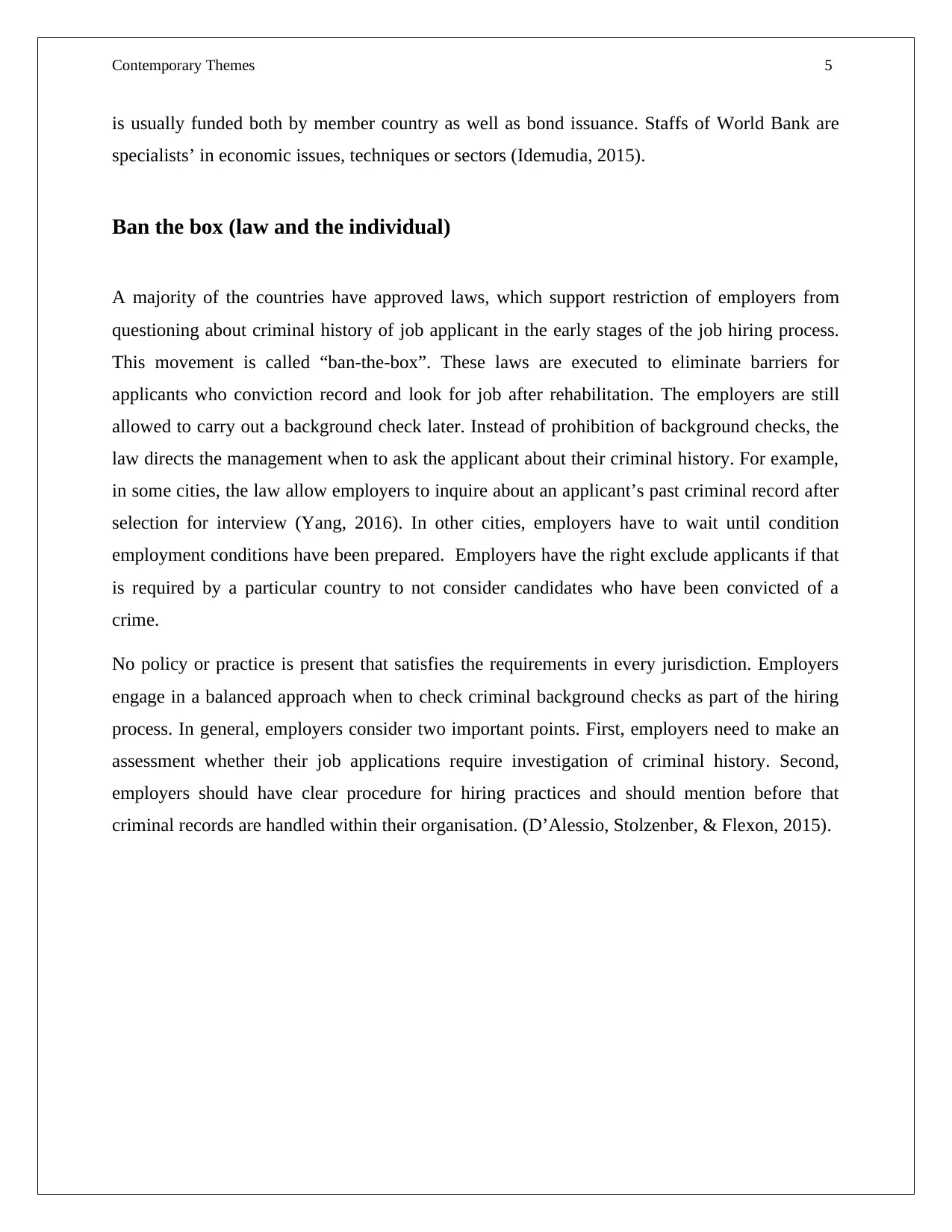
Contemporary Themes 5
is usually funded both by member country as well as bond issuance. Staffs of World Bank are
specialists’ in economic issues, techniques or sectors (Idemudia, 2015).
Ban the box (law and the individual)
A majority of the countries have approved laws, which support restriction of employers from
questioning about criminal history of job applicant in the early stages of the job hiring process.
This movement is called “ban-the-box”. These laws are executed to eliminate barriers for
applicants who conviction record and look for job after rehabilitation. The employers are still
allowed to carry out a background check later. Instead of prohibition of background checks, the
law directs the management when to ask the applicant about their criminal history. For example,
in some cities, the law allow employers to inquire about an applicant’s past criminal record after
selection for interview (Yang, 2016). In other cities, employers have to wait until condition
employment conditions have been prepared. Employers have the right exclude applicants if that
is required by a particular country to not consider candidates who have been convicted of a
crime.
No policy or practice is present that satisfies the requirements in every jurisdiction. Employers
engage in a balanced approach when to check criminal background checks as part of the hiring
process. In general, employers consider two important points. First, employers need to make an
assessment whether their job applications require investigation of criminal history. Second,
employers should have clear procedure for hiring practices and should mention before that
criminal records are handled within their organisation. (D’Alessio, Stolzenber, & Flexon, 2015).
is usually funded both by member country as well as bond issuance. Staffs of World Bank are
specialists’ in economic issues, techniques or sectors (Idemudia, 2015).
Ban the box (law and the individual)
A majority of the countries have approved laws, which support restriction of employers from
questioning about criminal history of job applicant in the early stages of the job hiring process.
This movement is called “ban-the-box”. These laws are executed to eliminate barriers for
applicants who conviction record and look for job after rehabilitation. The employers are still
allowed to carry out a background check later. Instead of prohibition of background checks, the
law directs the management when to ask the applicant about their criminal history. For example,
in some cities, the law allow employers to inquire about an applicant’s past criminal record after
selection for interview (Yang, 2016). In other cities, employers have to wait until condition
employment conditions have been prepared. Employers have the right exclude applicants if that
is required by a particular country to not consider candidates who have been convicted of a
crime.
No policy or practice is present that satisfies the requirements in every jurisdiction. Employers
engage in a balanced approach when to check criminal background checks as part of the hiring
process. In general, employers consider two important points. First, employers need to make an
assessment whether their job applications require investigation of criminal history. Second,
employers should have clear procedure for hiring practices and should mention before that
criminal records are handled within their organisation. (D’Alessio, Stolzenber, & Flexon, 2015).
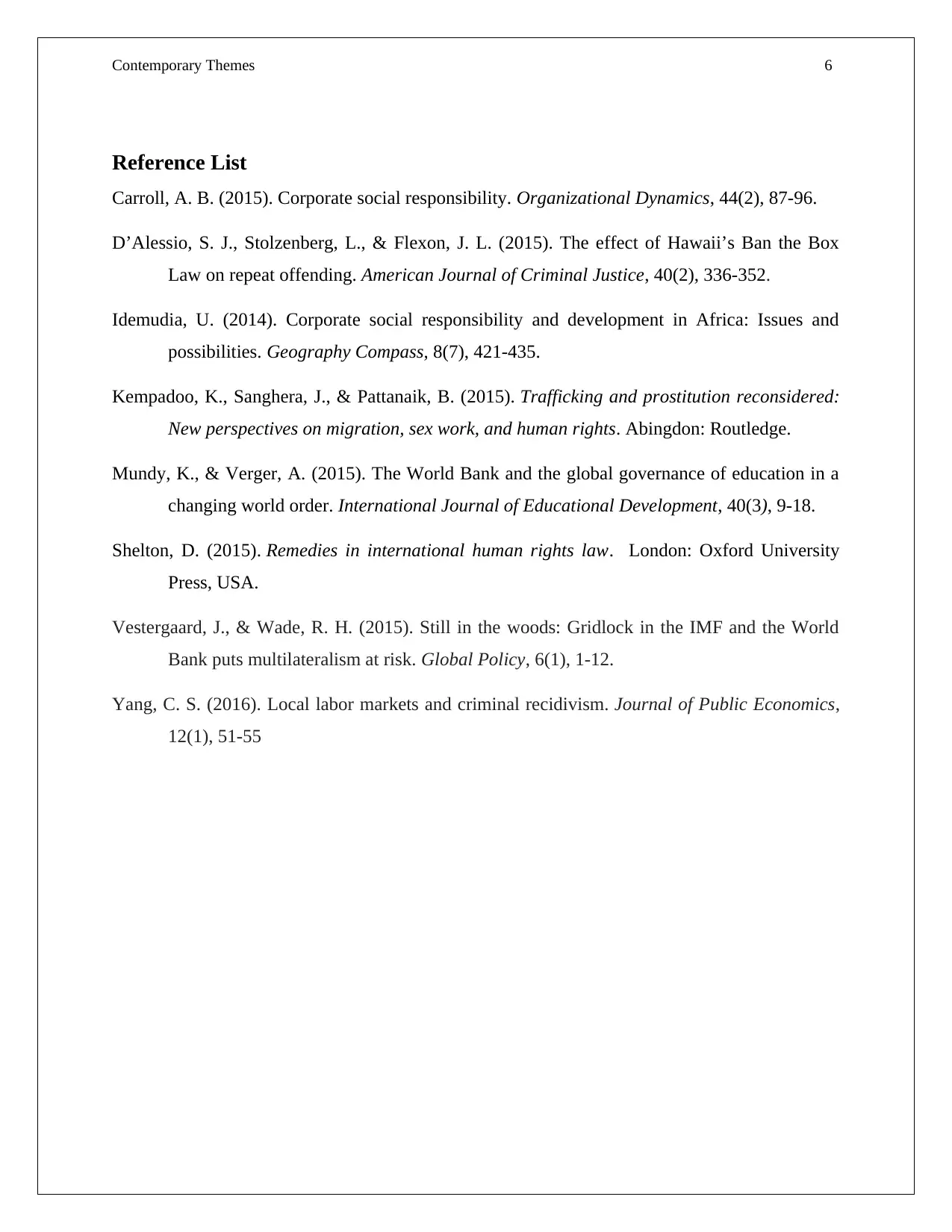
Contemporary Themes 6
Reference List
Carroll, A. B. (2015). Corporate social responsibility. Organizational Dynamics, 44(2), 87-96.
D’Alessio, S. J., Stolzenberg, L., & Flexon, J. L. (2015). The effect of Hawaii’s Ban the Box
Law on repeat offending. American Journal of Criminal Justice, 40(2), 336-352.
Idemudia, U. (2014). Corporate social responsibility and development in Africa: Issues and
possibilities. Geography Compass, 8(7), 421-435.
Kempadoo, K., Sanghera, J., & Pattanaik, B. (2015). Trafficking and prostitution reconsidered:
New perspectives on migration, sex work, and human rights. Abingdon: Routledge.
Mundy, K., & Verger, A. (2015). The World Bank and the global governance of education in a
changing world order. International Journal of Educational Development, 40(3), 9-18.
Shelton, D. (2015). Remedies in international human rights law. London: Oxford University
Press, USA.
Vestergaard, J., & Wade, R. H. (2015). Still in the woods: Gridlock in the IMF and the World
Bank puts multilateralism at risk. Global Policy, 6(1), 1-12.
Yang, C. S. (2016). Local labor markets and criminal recidivism. Journal of Public Economics,
12(1), 51-55
Reference List
Carroll, A. B. (2015). Corporate social responsibility. Organizational Dynamics, 44(2), 87-96.
D’Alessio, S. J., Stolzenberg, L., & Flexon, J. L. (2015). The effect of Hawaii’s Ban the Box
Law on repeat offending. American Journal of Criminal Justice, 40(2), 336-352.
Idemudia, U. (2014). Corporate social responsibility and development in Africa: Issues and
possibilities. Geography Compass, 8(7), 421-435.
Kempadoo, K., Sanghera, J., & Pattanaik, B. (2015). Trafficking and prostitution reconsidered:
New perspectives on migration, sex work, and human rights. Abingdon: Routledge.
Mundy, K., & Verger, A. (2015). The World Bank and the global governance of education in a
changing world order. International Journal of Educational Development, 40(3), 9-18.
Shelton, D. (2015). Remedies in international human rights law. London: Oxford University
Press, USA.
Vestergaard, J., & Wade, R. H. (2015). Still in the woods: Gridlock in the IMF and the World
Bank puts multilateralism at risk. Global Policy, 6(1), 1-12.
Yang, C. S. (2016). Local labor markets and criminal recidivism. Journal of Public Economics,
12(1), 51-55
1 out of 6
Related Documents
Your All-in-One AI-Powered Toolkit for Academic Success.
+13062052269
info@desklib.com
Available 24*7 on WhatsApp / Email
![[object Object]](/_next/static/media/star-bottom.7253800d.svg)
Unlock your academic potential
© 2024 | Zucol Services PVT LTD | All rights reserved.




